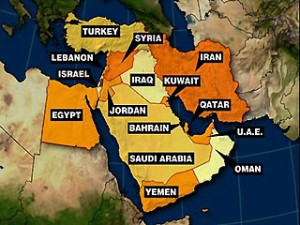Special to WorldTribune.com
WASHINGTON — Three Gulf Cooperation Council states have maintained stable relations with its large Shi’ite minority, a report aid.
The American Enterprise Institute asserted that Oman, Qatar and the United Arab Emirates have avoided Shi’ite unrest believed instigated by Iran. In a report, the institute said the large Shi’ite communities have been integrated into the Sunni-ruled states.
 “The Persian Gulf states of Oman, Qatar, and the United Arab Emirates have largely been immune to the rising tide of sectarianism that has rocked the Middle East in the wake of the Arab Spring,” the report, titled “Is Sectarian Balance in the United Arab Emirates, Oman, and Qatar at Risk?” said.
“The Persian Gulf states of Oman, Qatar, and the United Arab Emirates have largely been immune to the rising tide of sectarianism that has rocked the Middle East in the wake of the Arab Spring,” the report, titled “Is Sectarian Balance in the United Arab Emirates, Oman, and Qatar at Risk?” said.
“The three monarchies have successfully integrated their Shi’ite minority populations into their countries’ sociopolitical and economic spheres, giving those populations little reason to engage in violence or seek political guidance from Iran or Iraq.”
Researcher Ahmad Majidyar asserted that the Shi’ites in these three GCC states “strongly identify” with their homelands. But Majidyar said the calm could be disrupted by the Sunni revolt in Syria, in which Iran and its proxies have intervened.
The biggest threats were said to be against Qatar and the UAE. The
report, dated Oct. 21, 2013, said Oman, whose Shi’ites comprise five percent
of the population, marked a lesser degree of concern.
“Most notably, there is no Hizbullah branch in Oman,” the report said.
In contrast, the UAE contains 1 million nationals, up to 15 percent
Shi’ites. About 500,000 Iranians, many of them merchants, also comprise a
large part of the expatriate community in the emirates.
“Given the rise of sectarianism in the Middle East, the Emirati federal
authorities exercise more vigilance over Shi’ite citizens and Iranian and
Lebanese diaspora in the country,” the report said. “The authorities fear
that Iran may try to incite Emirati Shi’ites against the government and harm
sectarian balance in the country.”
In Qatar, Shi’ites were said to comprise between five and 15 percent of
the emirate’s citizens. The report said many of the Shi’ites live close to
the oil fields.
“In general, Iran has a strong presence in Doha: Iranian nationals make
up about 10 percent of Qatar’s foreign workers, Iranian merchants run
successful businesses in Doha, and there is even a main market in the
Qatari capital called Irani Bazaar,” the report said. “Despite their ties,
however, Qatari Shi’ites remain loyal to their state above all other foreign
Shi’ite influences.”

You must be logged in to post a comment Login